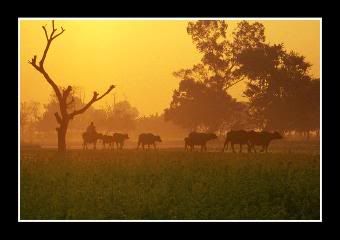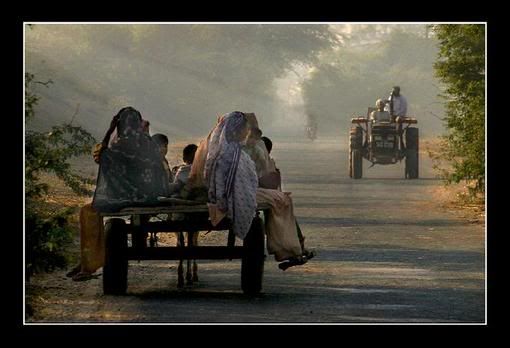Adil Najam
Every time I read one of Shirazi’s wonderful posts I am reminded of the fact that even though Pakistan is still a predominantly rural entity, the voices that speak about it are nearly entirely urban. Not surprisingly, we tend to speak about Pakistan in a mostly urban idiom, with a dominant urban bias, and using a strikingly urban imagery.
There is , of course, nothing wrong with the urban vernacular. It is, after all, the lived experience and felt reality of so many of us. However, there is something striking — and disturbing — about the near absence of the rural voice (Shirazi notwithstanding). This was not always so. An earlier generation of urban Pakistan was still very connected to the rural landscape; they were themselves rural migrants and understood the smells, the tastes, the sounds and the touch of rural Pakistan.
For too many urbanites in my generation and beyond, rural Pakistan is no longer a place you ‘go to’; it is a place you ‘pass through.’ In this age of motorways and airways, you pass through it as fast as possible; touching as little of it as you can. The tanga, the rail-garhi, the bus-larri (lorry) used to force us to stop and try out the wares of that platform, that bus-adda, that roadway khokha. There is no longer any need to stop and breathe in that little bit of rural freshness.
Politically, of course, we urbanites have turned the rural voice into the villian. The rural voice is the voice of the wadera, the jagirdar, the chaudhry, the sardar. To the extent that the vast majority of the rural proletariat enters the discourse, their role is merely that of observers on the periphery.
Conveniently, the ills we face are all of their making. We, the urban elite — at least in our own self-image — are the progressive, educated, enlightened forces being pulled down by the so-called ‘feudal’ tendencies of rural Pakistan. Even in less stark narratives, it is we the urban elites whose responsibility it is to bring — even if we have to drag them — rural Pakistan into the ikeesvien saddi (21st century). We are, and we must be, the benevolent modernizers of the ‘rural masses’ (‘masses’, of course, is that de-individualizing term of endearment that is always applied to them, but never to us).
All this, and more, I worry about. And when I do, one of the places I seek refuge in is the photographic portfolio of Umair Ghani, whose work we have featured on ATP before. Umair’s work speaks poignantly and beautifully of the reality of rural life in Pakistan (Punjab in the case of these pictures).
P.S. This is a repost of a post first published at ATP on August 10, 2006.























































Can someone please tell me who is this Adil Najam and where can I find him?
I used to know him in the past but now this Adil Najam is no where to be found.
If you do run into him, please let him know, he is fondly remembered and dearly missed.
I just read this, it is beautifully written and beautiful pics. This is the real Pakistan that we always forget about.
This is great – keep up the good work!
[…] Before saying more about both, let me just put my own views on the table. First, I think that the ‘feudalism’ card is a favorite boogie of the urban educated elites of Pakistan. It is a very convenient thing to blame all our problems on. Why have we not had democracy? Feudalism. Why does the economy not flourish? Feudalism. Why did we lose to South Africa yesterday? Feudalism. Feudalism and the so-called ‘unparh, jahil awam’ are our scapegoats of choice. It is a very easy way for us urbanites to disown ourselves from many of our own sins. […]
Raza, Adnan, I think your points are very valid. ButI hope you will agree that it is not JUST the rural elite. Yes, there is much there that needs to be drasticcally changed. But, we in urban Pakistan also find them to be such convenient excuse. I know you are not suggesting this, but in general, it is too easy for us to blame everything on feudalism. I think I once heard Adil Najam make this point in a talk on Pakistan, that the real feaudalism in Pakistan today is mostly urban feudals. So no govt. ever really wanted to do anything about it because rural elite serves a useful purpose for urban elites.
Bilal, I hope you are not syaing it is our job to “help” “them”, these poor rural Pakistanis. See sabizak comment on “wit mans burden”.
Glad this topic is brought up. We nearly never discuss these serious issues.